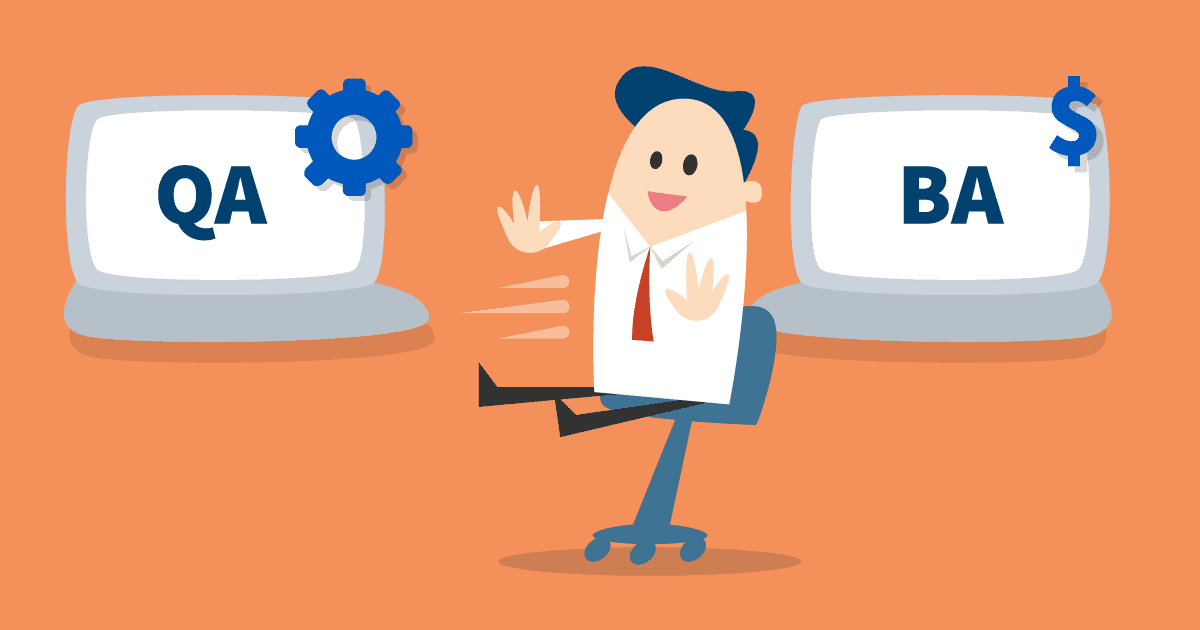Software testing career paths have many options, including QA to BA transition, which can be a logical move because both roles have plenty in common.
The roles of a quality assurance engineer or tester, and a business analyst are often interchangeable in the workplace. The primary role of a tester is to aim for the application under test to work flawlessly according to the specifications, while a business analyst works from the customer’s viewpoint towards having the application meet the requirements.
Because of these points in common, it is relatively easy for a tester to change career to exploit their full potential as a business analyst, and this move may already be a part of your Career Development Plan. In this article, our aim is to pave a QA to BA transition for testers who are looking to upgrade their skills, and profile, or if they are already at the peak of their QA career where they no longer find challenge in that role.

Choosing a Business Analysis as a Career
Quality assurance engineers or testers are closely involved in the software development life cycle from the initial phase until the application’s release. They understand more about the application because they are the main contributors to improving the app’s quality, which is the main reason testers can step into many roles in the software industry. If a tester has a good understanding of software development processes and techniques, he or she can move to work in automation, DevOps, work as a manager, or as a business analyst. Although a tester can advance within their field, the career of a business analyst has far greater potential.
If as a tester you have excellent oral and written communication skills, are comfortable with client interaction, and possess good analytical skills, then you have the right attributes for the business analyst role.
Reasons to Switch Roles
A professional tester can have a good chance of becoming a business analyst. Many of the reasons are below.
- Attention to detail: A good tester with a keen eye for detail stands a good chance of successfully working as a business analyst.
- Customer’s First: For any business, the customer is the priority and testers need to keep customer satisfaction foremost in their mind. Similarly, a BA must make the customer’s interest as their top priority to succeed.
- Interpersonal Skills: Both the tester and a BA need to understand and analyze the specific requirements of the system being developed, and knowing how to professionally discuss issues and problems with other members of the team and stakeholders is a necessary skill. Moreover, the analytical skills of a tester can overcome any ambiguity found in the requirements which is helpful in the role of a business analyst.
- Think Out of the Box: Good testers are those who think critically. This highly sought mental skill helps both the tester and BA in any analysis gaps in the requirements.
- Documentation: At all points during the project lifecycle, testers will be involved in documentation such as test planning, test case development, and defect reporting, which is necessary for BA as well.
Transitioning to BA – Step by Step
- Observe the role: The first step is to begin preparing by observing the business analyst role in your organization. In an agile environment, all stakeholders work closely together which makes it easy for testers to learn about the role of BA. A good approach is to share the workload with the BA by picking up smaller tasks along with your own responsibilities. Whenever the BA interacts with the client, observe closely and try to absorb what you learn.
- BRD or Business Requirements Document: Understand and analyze the BRD provided by the BA as this document is written from the perspective of the customer’s perspective. Relate the BRD to other available documents to analyze any gaps between them.
- Communication Skills: If the activities mentioned so far excite you, then start working on probably the most important skills needed by BA, which is communication. It is vital to have an excellent understanding of the English language and strong skills in oral and written communication. A business analyst performed as the mouthpiece between the customer and all other stakeholders. They gather requirements and liaise between developers and testers, ironing out any misunderstandings on either side. If the BA is not proficient enough in transferring the requirements into the specifications for development, then poor communication skills can affect the production of the system being built.
- Higher Education Degree: To succeed in a BA role, a master’s degree in management (MBA or equivalent) is required. Although many business analysts don’t have a higher degree but reputable organizations that offer lucrative careers always consider a BA candidate with a management degree. A management degree from a reputable institute can enhance your skills and instill leadership qualities along with decision-making skills at the managerial level. There is also a huge difference in salaries between MBAs and non-MBAs.
- Job Hunt: The last step is vital because you have to seek out the role of BA in various organizations. The best route is usually to look within the organization where you are currently working, which is beneficial in many ways. You won’t need to start from scratch in the current organization because everyone will already know you and your goals, and being familiar with the current business process will be an added advantage.
- Skills Enhancement/Certifications: Once settled in the role, a business analyst should continue to improve their skills. There are various certifications available for business analysts which are recognized worldwide. Separate to the certifications, a BA should be familiar with prototyping tools such as Microsoft Visio, Justinmind, or Adobe XD, for creating wireframes, flow diagrams, documentation, and so on.
Conclusion
Technological advancement has opened multiple opportunities for people in various domains because it is relatively easy for people to shift from one field to another one easily if they have the right set of skills. A tester can select from various fields, but the BA role has the highest potential. As discussed in the article, it is not too difficult for a tester to shift into a BA role but dedicated effort will be required to achieve a competitive position.
